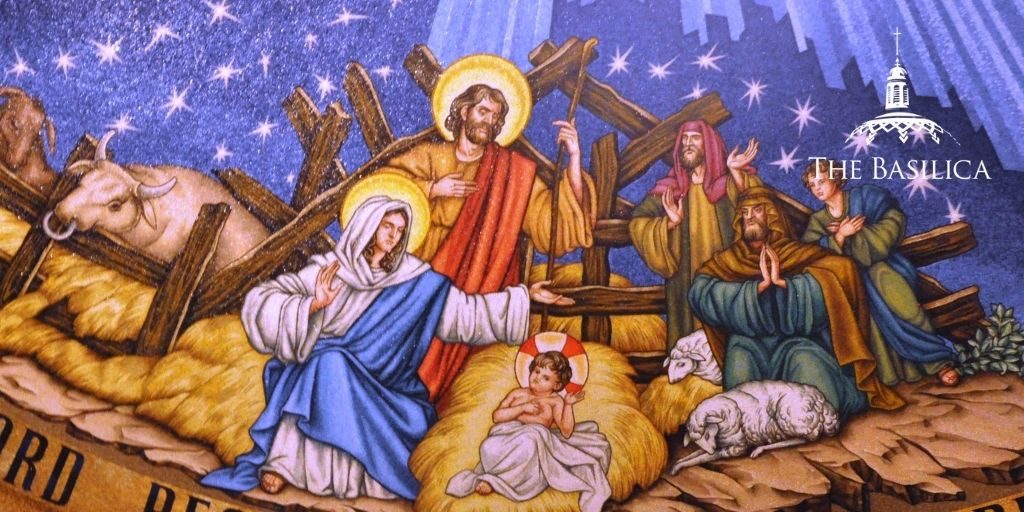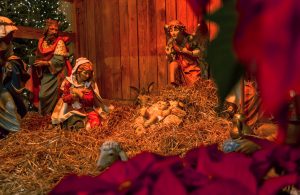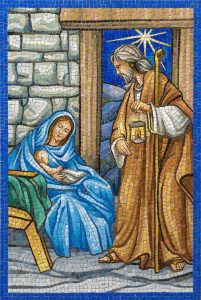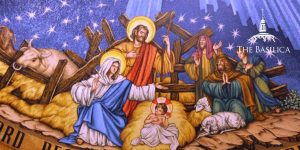
Christmas is one of the most important celebrations of the Christian faith – and for good reason: it celebrates Christ’s birth on earth, a critical moment in the story of divine redemption. For many of us, the familiarity of the Nativity story can make us lose sight of its profundity. Yet year after year, we should never cease to be awed by the miracle and beauty of the incarnation. As we approach the Nativity, Monsignor Rossi discusses the importance of the Nativity, Mary’s role, and how we can view it through fresh eyes.
As members of the Catholic Faith, how can we best prepare our hearts for Christmas?
 We can prepare for Christmas in the same way that we should prepare for every event in life: through prayer. Prayer, Pope Francis reminds us, “makes us attuned to the Lord.” In addition, the saints remind us that with everything we do, prayer should be part of the beginning, middle, and end of our undertaking, so that what we do is God-centered and not self-centered.
We can prepare for Christmas in the same way that we should prepare for every event in life: through prayer. Prayer, Pope Francis reminds us, “makes us attuned to the Lord.” In addition, the saints remind us that with everything we do, prayer should be part of the beginning, middle, and end of our undertaking, so that what we do is God-centered and not self-centered.
Traditionally, the Advent Season is a time of many Church events in preparation for Christmas, but this year, with the coronavirus pandemic, Church gatherings are limited, and many people are isolated. More than ever, our own life of prayer in preparation for Christmas needs to be heightened this year.
Among the many prayers one can offer is the Rosary, the great Marian prayer that leads us more deeply into the life of Our Lady and Our Lord. Spending time in Scripture is another practice that opens us to God’s Word, God’s presence, and God’s activity throughout salvation history, equipping us in our faith.
How can we view the significance of the Nativity with fresh eyes this year?
The coronavirus pandemic has forced all of us to look at life in general with fresh eyes. If this year has taught us nothing else, it has been that life is precious, fragile, fleeting, and needs to be cared for, respected and protected.
The first Christmas was celebrated in less-than-ideal surroundings. Mary and Joseph welcomed their Son into a world that was torn and in need of healing. Christmas 2020 should remind us that we are not much different than the Holy Family and that like the Holy Family, we need to take care of each other.
How can we reflect on the importance of Mary in the Christmas story? What is the significance of her role?
The Blessed Mother is central to the Christmas story as she is the one who gave birth to the Savior of the World. Throughout her life, Mary placed herself in God’s hands and at God’s service. The recorded words of Our Lady are rather limited, but the words we have are extremely significant: “I am the handmaid of the Lord. Be it done to me according to your word.” Mary’s Fiat, her “yes” to God, should serve as a model for each of us in life.

What are some of the ways that the Christmas story has been meaningful in your life?
I remain amazed that in the Nativity of Jesus, God chose to become one of us, a tangible human being. With the Nativity, we now can physically see God, see how God acts, and hear how God speaks. God is no longer “otherworldly” but also of this world!
How can we experience the joy of Christmas amidst the busyness of the season?
Yet another silver lining of the pandemic is that this Christmas will probably be less busy than others, and so folks will hopefully focus more on the real “reason for the season” as the slogan goes, the Birth of Jesus. It’s easier to concentrate on what matters when there are fewer trappings to distract us!
How do we see the Trinity at work in the Christmas story?
The message of Christmas is that God, the first person of the Blessed Trinity, is with us in Jesus, the second person of the Blessed Trinity, whom we refer to as God the Son. As we pray in the Creed, Jesus is “consubstantial” with God the Father and through the power of the third person of the Blessed Trinity, God the Holy Spirit, “was incarnate of the Virgin Mary, and became man.”
How does the Incarnation play into God’s greater plan for our salvation?
Saint Augustine addresses this question in his discourse on Psalm 109 when he states that God “wanted, through his Son, to show us and give us the way he would lead us to the goal he has promised. It was not enough for God to make his Son our guide to the way; he made him the way itself, that you might travel with him as leader, and by him as the way. Therefore, the only Son of God was to come among men, to take the nature of men, and in this nature to be born as a man.”
In addition, the Catechism of the Catholic Church provides insight in articles 457-460, where the Catechism teaches that the Incarnation took place, “in order to save us by reconciling us with God…so that we might know God’s love… to be our model of holiness…(and) to make us partakers of the divine nature.”

